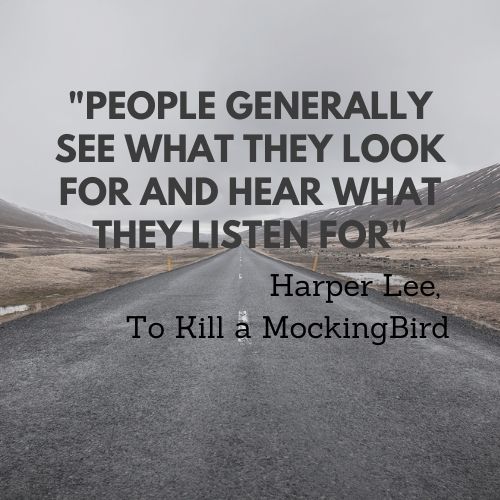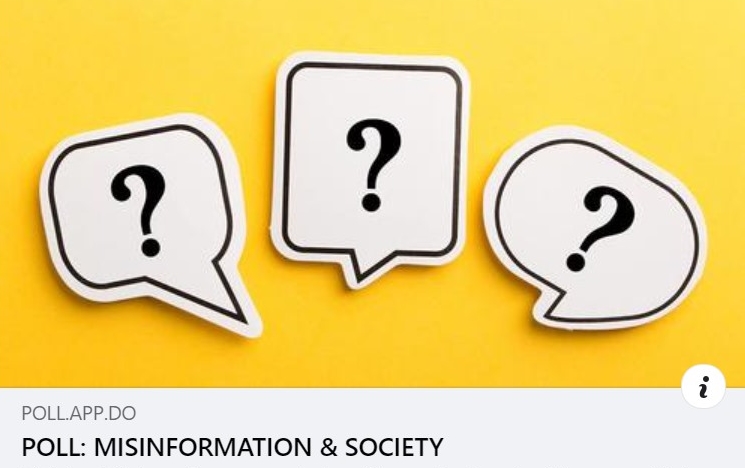If people did not know about misinformation before, the COVID-19 pandemic has cast a massive spotlight on this issue. The World Health Organization declared an infodemic in 2020 due to the overwhelming amount of virus disinformation on the internet. An infodemic is described as “too much” false information circulating online or in the community during a pandemic. Disinformation being created and misinformation being spread during a virus outbreak can cause confusion and irrevocable harm. As I spoke about in my last blog post, public confusion erodes trust in leadership.
Mistrust in experts and processes forces people to seek outside sources to fill the gap. The need to fill an information void could lead to less credible sources. People inherently seek information that aligns with previously held conceptions. This way of thinking has detrimental effects on decision-making. Confirmation bias prevents people from believing concrete evidence, which could cost someone their livelihood, or worse, their life. For this reason, many experts across the nation feel the infodemic may be worse than the pandemic.
Out of concern for public health and safety, 270 medical professionals signed an open letter to Spotify calling for The Joe Rogan Experience to be canceled. The open letter came after Rogan interviewed a virologist who has been banned from social media for COVID-19 misinformation. The medical professionals claim misinformation spread will be of a scale never seen before due to the show’s immense popularity. They worry the effects of this could have “dangerous ramifications.”
History Repeating Itself
In 1992, radio entertainer Howard Stern was hit with a record-making $600,000 fine from the F.C.C. for graphic comments made during his show’s broadcast on public airways. The Washington Post reported the actions taken by the F.C.C. were tantamount to selective censorship. Stern continued to defy regulations and resumed business as usual. Stern decided to leave traditional broadcasting in 2006 due to being “tired of the censorship.”
The F.C.C., in 2004, began to increase fines for indecency violators and called for stricter legislation on content being aired. Media outlets called this an attack on the First Amendment and freedom of the press. Stern’s move to satellite radio was thought to be a “test” on free speech since this new medium was not under F.C.C. control. However, Stern’s move led some journalists to predict whether lawmakers will try to place subscription-based media under F.C.C. regulation in the future.
The Future May Be Here
Today’s Rogan controversy is reminiscent of the Stern uproar in 2004. Howard Stern’s show also faced an outcry for cancellation. Stern reported his advertisers were being “bullied” and “threatened” with boycotts by religious groups. He even questioned why former Secretary of State Colin Powell’s son was tasked with the privilege to tell the public what is or is not decent. Stern’s broadcaster was targeted too and paid millions in fines to the F.C.C. After battling this for years, the broadcaster felt its only option was to drop Stern’s show.
Rogan’s podcast host, Spotify, is also under attack. The platform is being accused of permitting the proliferation of hazardous information and having no misinformation mitigation policy. Spotify responded to these claims. They acknowledged their responsibility to the safety of their users while balancing creative personality expression. Spotify C.E.O. said they would not, though, take on the role of “content censors.” They have since updated their platform policies, removed episodes that violate those policies, and placed a “content advisory” notice on content involving COVID-19.
Spotify being the next platform in the hot seat, reform of Section 230 is in the news once again. The Joe Rogan show could be the tipping point that ushers in change to platform protection. I will bet the other platforms are biting their nails while waiting to see what happens with Spotify.
The Difference Between 2004 and 2022
Terrestrial radio falls under the control of the Federal Communications Commission, whose role is to regulate broadcast communications nationwide and internationally. The F.C.C. controls content it deems “obscene, profane, and indecent” broadcast over the airwaves. Obscenity is not covered under the First Amendment. The F.C.C. also does not enforce profanity and Indecency rules on user-paid subscriptions services. These details would explain why Stern’s show has not been fined since his move to satellite radio in 2006, as long as his content remains free of obscenities.
Spotify considers itself a platform that distributes content created by others and is not content producers themselves. This attitude is similar to the ones held by social media platforms. Internet-based companies are protected under Section 230 of the Communications Decency Act, which states:
“No provider or user of an interactive computer service shall be treated as the publisher or speaker of any information provided by another information content provider“ (47 U.S.C. § 230)
Section 230 basically means no website hosting user-generated content is liable for the speech of any user. Since the platform cannot be held responsible, users can freely speak their minds, even when controversial. Spotify does not have its “back up against a wall” like Stern’s broadcasting company did in 2004. Spotify has the protection of Section 230 to stay its course. However, they need to tread lightly because they depend on public participation, and threats of subscriber cancellation could cause them to change tactics.
Joe Rogan, an entertainer, hosting his podcast on Spotify allows him creative freedom to say what he wants. However, his content must now stay within the platform policies. Several of Rogan’s episodes were removed for violating Spotify’s policy. Stern’s 2004 journey to freedom of speech has close ties to Rogan’s current conflict for the same thing. Stern changed his show’s tone in 2016, but the change was gradual. Stern had to start refraining from using obscenities on his show, as I mentioned earlier. I suspect Rogan will do the same and has said his future episodes will be more balanced.
A Platform Challenge
The parallels between the Stern and Rogan plights continue. In 1995 large chain restaurants pulled advertisements on the Stern show. The advertisers were unhappy with his comments and called for other advertisers to boycott the show as well. Reports of advertiser defection occurred abroad in 1997. Today, Rogan and Spotify face calls for the show’s cancellation and Spotify subscriptions to be canceled. Well-known musicians are calling for fellow artists to pull music from the platform. Subscribers are also calling for subscription cancellation, and a poll finds 19% of them may do just that.
Musicians’ and subscribers’ cries for cancellation is not the only issue Spotify faces. The platform’s employees have been putting them on notice for a while that Rogan’s content is offensive and dangerous to public health. Spotify employees have even expressed their concern whether Rogan is a “rogue employee” since Spotify pays for the content and not a royalty percentage like the musicians get. Spotify has had to respond to this claim as well.
Spotify continues to draw the distinction that they only pay for licensed material and have absolutely no creative control over Rogan. However, reports have surfaced that content conversations between the platform and Rogan have occurred, which could blur that line. Spotify needs to tread lightly here. To remain “just” a content hosting platform, they cannot make decisions that create an employer/employee relationship with Rogan. As seen with the Stern show’s broadcasters, the platform is standing behind Rogan and his right to free speech, for now.
Is There a Solution to Appease Everyone?
Platform algorithms are where differences begin to appear between the two shows. With today’s computer technology and the discovery of AI, Rogan’s show is easily amplified and pushed based on user preferences. Another difference is in the content. Stern has been accused of lude and crude content. This type of content has its issues but is not considered life-threatening. In contrast, Rogan’s content is seen by many people, including health experts, as harmful to public safety. This distinction begs the question, does free speech apply to everything except health misinformation?
So, what should Spotify do? Spotify can:
- Do nothing and hope the controversy blows over. This is the approach Stern’s broadcasters took initially. Stern was eventually fired and took his show to a platform with no speech restrictions. The Rogan show is already on a platform promising that freedom.
- Cancel their contract with Rogan. This proposition would cause huge legal ramifications for Spotify and potentially bankrupt the platform. Under this scenario, everyone loses.
- Have all internet platforms ban his content. This is unrealistic because there will always be a provider that will gladly host his show and reap the rewards. Banning his show only satisfies half of the public as well. If banned, this will then cause an uproar with the other half.
I cannot see a clear-cut solution. Professionals, employees, content producers, and subscribers have made their position known to the platform. Spotify appears to be responding to public concern by removing episodes that violate newly established policies and placing content advisory notices on specific content. Rogan has apologized and vows to address his content accordingly. Hopefully, these changes and promises can bring resolution to this issue.


